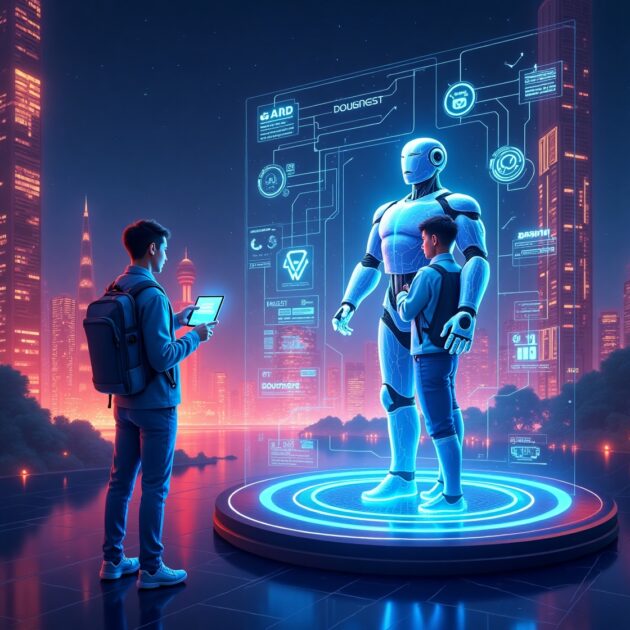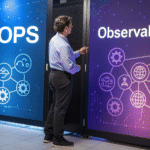Generative AI Power Virtual Agents in Immersive Worlds

AI agents are changing the way we experience virtual worlds and digital assets. These smart systems make virtual environments more interactive and personal. They help businesses save time, reduce costs, and offer better experiences to users. This article explains how Generative AI power virtual agents and immersive worlds, focusing on the benefits they provide.
Artificial Intelligence
AI agents are reshaping virtual worlds. These intelligent systems make digital spaces more fun, interactive, and personalized. By using AI in virtual environments, businesses can create experiences that adapt to each person’s preferences in real-time. This leads to more engaging experiences for users.

In this article, we will look at how AI agents work in virtual worlds, the benefits they bring, and how they’re being used in different industries. Let’s explore how AI agents are making virtual environments smarter.
AI Agents Powering Virtual Assets & Immersive Worlds
AI agents are systems that can make decisions and learn from experiences without needing constant human input. They use data to understand their surroundings and adjust what happens next. In virtual worlds, AI agents manage everything from controlling characters to adjusting the environment.
For example, in a video game, AI agents can control how characters behave. They can make sure the game feels interesting by changing the difficulty based on how well the player is doing. This makes the game feel fresh every time.
How AI Agents Power Virtual Assets and Immersive Worlds
- Making Virtual Worlds Interactive
AI agents make virtual worlds more exciting and dynamic. They adjust the environment based on how the user behaves. For example, if you’re exploring a virtual city, AI agents can change the weather or control traffic to make the experience feel more realistic and fun. - Automation of Repetitive Tasks
AI agents can handle tasks like managing virtual resources, adjusting lighting, or controlling non-playable characters (NPCs). This saves time and lets users focus on more creative or important things, like solving puzzles or making decisions. - Personalizing Experiences in Real-Time
One of the best things about AI agents is how they personalize experiences. They learn from how users interact with the virtual world and change the environment to fit their preferences. For example, in a virtual shopping experience, AI agents can suggest items based on what the user has looked at before. This makes the experience feel more unique and tailored to the user. - Better Decision Making
AI agents can help make smarter decisions in virtual worlds. For example, they can manage virtual resources, adjust NPC behavior, or change the difficulty of a game based on data. This makes virtual worlds feel more responsive and realistic. - Supporting Large Virtual Worlds
AI agents are key to making virtual worlds bigger and more interactive. They can handle a large number of players and ensure everything runs smoothly. For example, in a multiplayer online game, AI agents can control many characters and keep the experience fun without lagging.
Profits of AI Agents in Virtual Assets and Immersive Worlds
- Better User Experience
AI agents make virtual environments feel more real and engaging. They adjust the world based on how users act, making each interaction unique. This helps users stay engaged for longer periods. - Saves Time and Effort
By automating tasks, AI agents help users save time. Instead of having to control everything manually, AI takes care of the small tasks. This lets users focus on the fun or important parts of the experience. - Reduces Costs
AI agents help businesses save money. They can automate tasks, reduce the need for human workers, and make virtual environments run more smoothly. This cuts down on the cost of running large-scale virtual worlds. - Customizing Experiences
AI agents can personalize every experience. They track what users like and adapt the environment to suit those preferences. This helps create a more enjoyable experience every time someone enters the virtual world. - Encourages Creativity and Innovation
By using AI agents, businesses and creators can experiment with new ideas. AI makes it easier to build complex and creative virtual environments that can change based on what users do. This leads to more innovative and unique digital experiences.

Pros and Cons of AI Agents in Virtual Assets and Immersive Worlds
Pros:
- Improves User Engagement: AI agents make the environment feel more alive and interactive, encouraging users to stay longer and explore more.
- Saves Time: AI takes care of repetitive tasks, allowing users to focus on more important activities.
- Cost-Effective: By automating tasks, businesses can reduce costs and run large virtual worlds without needing many workers.
- Personalized: AI agents customize the experience for each user, making interactions more relevant and enjoyable.
- Scalable: AI can manage large environments and support many users without slowing down performance.
Cons:
- Technical Challenges: Creating and maintaining AI-driven environments can be difficult and require advanced knowledge.
- Privacy Concerns: AI agents collect data on user behavior, which can raise concerns about how that data is used.
- Initial Costs: Setting up AI systems can require a lot of money and resources at the beginning.
- Depends on Data: AI agents need high-quality data to work well. If the data is poor, the system may not perform as expected.
Frequently Asked Questions
1. What are AI agents?
AI agents are smart systems that can make decisions and learn from experiences without human help. In virtual worlds, they control characters, environments, and other elements to create personalized experiences.
2. How do AI agents improve virtual environments?
AI agents make virtual worlds more interactive and personalized. They adjust the environment based on user actions, making each experience unique.
3. Can AI agents save businesses money?
Yes, by automating tasks and improving decision-making, AI agents help businesses reduce the need for human workers and run virtual worlds more efficiently, saving costs.
4. What are the challenges of using AI agents?
The challenges include technical complexity, privacy concerns, and high initial costs to set up AI systems. AI also relies on good-quality data to function properly.
5. How do AI agents personalize virtual experiences?
AI agents track user behavior and preferences, adjusting the virtual world to suit their tastes. This makes the experience feel more unique and tailored to each person.
Conclusion
AI agents are making virtual worlds smarter, more interactive, and more personalized. By automating tasks, improving decision-making, and creating engaging experiences, they offer many benefits for both users and businesses. As AI technology continues to grow, the possibilities for virtual worlds and immersive experiences will only expand. AI agents are here to stay and will keep transforming how we experience digital environments.
Thank You



